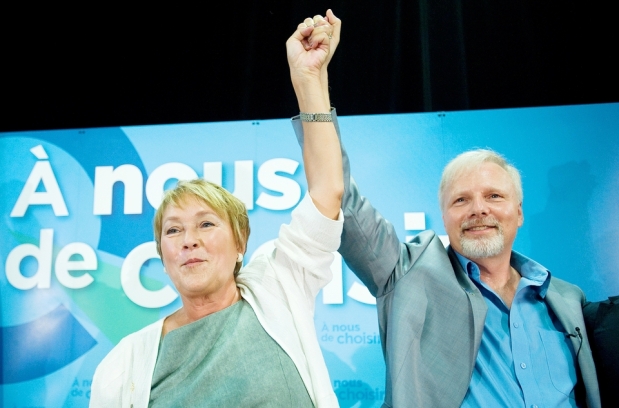 A commission delving into the debate over the Quebec proposed charter of secularism can serve as an inspiration for an English Canada growing increasingly fed up with multiculturalism, the Parti Québécois government says.
A commission delving into the debate over the Quebec proposed charter of secularism can serve as an inspiration for an English Canada growing increasingly fed up with multiculturalism, the Parti Québécois government says.
It has been more than four months since Quebec began debating the need to further separate church and state and to enact a public-sector ban on religious symbols, but parliamentary hearings that start on Tuesday – the final step before the bill can be voted into law – could be the spark that sets a secular wildfire burning across the country.
That, at the very least, is the word from International Relations Minister Jean-François Lisée [pictured, with Parti Québécois leader Pauline Marois], as nearly 300 Quebec citizens and organizations from across the spectrum prepare to dive back into the contentious debate over religious accommodation.
Lisée, who is the PQ’s interlocutor for Quebec anglophones and those outside Quebec, writes in a New York Times opinion piece that while the initiative is opposed by the federal government, anglophones, universities, hospitals, municipalities and others, it has the potential to push Quebec to the vanguard of a secular trail being blazed in Europe and around the globe.
“In a very real sense, the debate over Quebec’s charter may be the last stand of Canada’s multiculturalist experiment. Whatever the immediate outcome, it may be only a matter of time until Canadian multiculturalism finds itself buried alongside its European siblings,” he writes.
The piece makes no reference to the recent incident in which a York University student, citing religious objections, was given permission to opt out of course work in order to avoid coming into contact with female students.
But any debate over reasonable accommodations that makes headlines outside of Quebec illustrates the PQ minister’s argument that faith-based friction is a sleeper issue across the country. That resentment, Lisée says, stems from the “multiplication of ethnic enclaves” in English Canada.
The Quebec commission, which is set to hear from some 270 witnesses at a rate of about 20 a week, will likely only inflame a debate that has already ignited passions, entrenched divisions and, according to some observers, made Quebec a more menacing place for the visibly observant of all faiths.
The legislation proposes a framework for handling requests to opt out of standard practices for religious reasons, greater adherence to gender equality and, most strikingly, a prohibition on doctors, police officers, teachers, daycare workers, nurses, bureaucrats and the like from wearing symbols of faith in the workplace.
There is all-party support for most aspects of the bill in the Quebec legislature. But it is the clothing-and-symbol ban that has killed the consensus. And with a snap election expected this spring in Quebec, the initiative may be solved with the votes of citizens rather than provincial lawmakers.
While the debate begins again, it is unclear how the debate could change given the entrenched positions taken by most big institutions, public figures and pillars of influence in Quebec.
Montreal’s English-language school board, for example, is firmly opposed and said it cannot comply with the bill as it has been presented.
“Since when does wearing a symbol equate with abusing authority?” it said in a written brief submitted to the commission. “There is no question that secularism is becoming a religion which is being imposed on a pluralistic society. In a misguided attempt to demonstrate that the state is neutral, this legislation would show that Quebec is no longer open to pluralism. By dictating what cannot be worn, the law supposedly removes ‘unwanted values.’ ”
Also coming out against the ban on religious symbols is the province’s largest union, the Quebec Federation of Labour.
“It’s not possible for the (union) to support a measure that would have the effect of breaking the solidarity of people who work together because we have decided to restrict the fundamental liberties of a only small number of people,” the union said in its submission to the commission. It also predicts being called upon to back members who could be affected by the legislation and are put at risk of disciplinary measures or losing their jobs.
But that will not stem the vocal support of those who claim a values charter will relegate religion to its proper place in society. They range from university professors to feminist activists to legal scholars who have endorsed the bill.
But they also include a handful of intolerant voices that rise above the din of province-wide debate, like that of Yves Michaud, a PQ stalwart and former representative of Quebec in France who described the demand for religious accommodations as a societal “cancer.”
“It’s better to prevent it than to treat it. Yes, it’s a cancer because a normal society shouldn’t tolerate any compromise with religions,” he told The Canadian Press last week.
Michaud acknowledged public sector workers will face the tough choice of removing their turbans, kippas, veils or crucifixes or losing their jobs. If they don’t like that choice, that’s just too bad. “They can go to another country where it’s tolerated,” he said.
